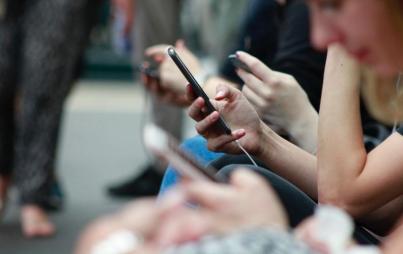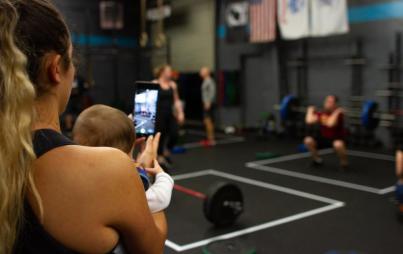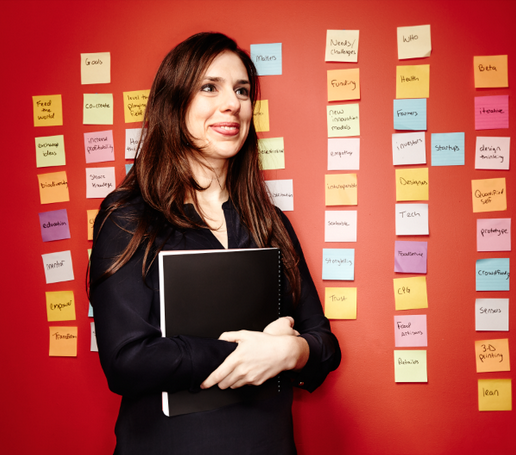
While most of us don't want to see food and technology in the same sentence (we all too often equate it with GMOs and pesticides), technology is actually the unlikely hero in a recent surge of education and innovation in terms of how—and what—we eat.
In this cause, Danielle Gould is a crusader. In 2009, she first launched the fledgling Food+Tech Connect as a blog, in the hopes of leveraging the ubiquity and speed of big data and technology to improve our food system. What she discovered was that everyone from farmers and foodies to founders of agricultural start-ups all wanted to share their stories. The blog ceased to be a platform for information and instead evolved into a thriving conversation where Gould curated conversations, shared stories from around the world and served as a hub for connection and cross-pollination.
Gould believes that technology—from sensors and software to crowdfund platforms, food apps and yes, even Twitter—is responsible for fueling what she believes is a true revolution in food and agriculture, empowering consumers to make more informed choices and small companies to fundamentally shift the way we sell, produce, distribute and consume our daily bread.
Food+Connect has since evolved into a full-blown business, which in addition to offering an vibrant—and extensive—hub for entrepreneurs, artisans, journalists, investors and food junkies, also boasts hackathons, meetups and online education.
We sat down with Gould to pick her brain on the brave new world of food+technology, and why we shouldn't be scared, but elated.
So what was the first inkling you had that people were hungry for this information and technology could help foster that?
Four years ago I was working for a company called BrightFarm Systems—we were a design consultancy firm for rooftop greenhouses. When I was working there, I became really fascinated by Twitter. I was fascinated by how it enabled easy information flow and by the possibility of big data to improve decision-making. I started thinking a lot about all this information we didn't have access to as a company: how much food was grown in the city; prices paid to food producers—information we needed to make business decisions. The thing was, peoplewere openly sharing this information on Twitter, Facebook and list serves. The question was how to scrape this all together to get a real-time picture of what's going on with food.
I started Food+Tech Connect as a way to figure that out
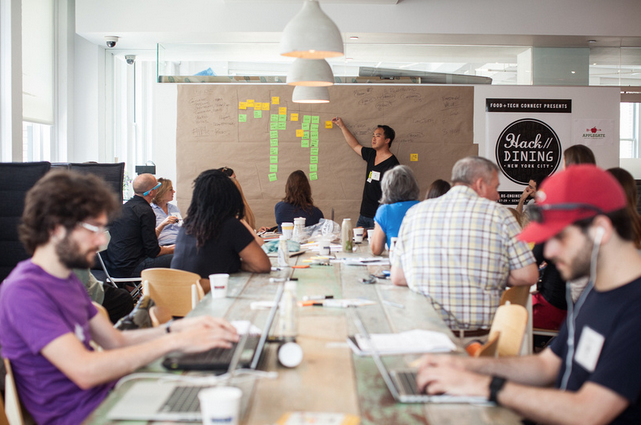 Can you tell me a little bit about Food+Tech Connect's take on hackathons?
Can you tell me a little bit about Food+Tech Connect's take on hackathons?
We view hackathons as a great medium for bringing people from diverse backgrounds together to collaboratively tackle big challenges in a short period of time. Our first ever food hackathon in 2011 was a simple event that we pulled together in like a month on a $1,000 budget and had 60 people participate.
The following year we hosted the Farm Bill Hackathon; we were aiming to help the public understand how the Farm Bill would impact their lives. After I did that, I got an invitation to the White House to attend a closed door meeting. That was more than three years ago now, but it made me feel like this is bigger, there's something here.
Next we did Hack//Meat where we tackled issues in the sustainable meat industry.
Our latest hackathon—Hack Dining—happened this June. We brought together more than 250 people from the restaurant and dining world in addition to chefs, engineers, entrepreneurs, designers and data scientists. We partnered with Google, Applegate, Chipotle, Batali & Bastinach Hospitality Group and Studio Industries. The whole goal for the weekend was to break down and tackle big problems affecting the industry.
How did this all get off the ground?
At the beginning Food+Tech Connect was really just a landing page for a survey for an app idea that we put out. But we immediately had so much traffic we started putting up content and people started reaching out telling me what they were working on.
When I left Bright Farms I had three months rent and that was basically it. I didn't know what I was going to do but I knew I could use Food+Tech Connect as a tool to figure it out. I started writing a lot about open data and agriculture and interviewing start-ups. Then I started hosting events. Now, there's food start-ups in the news all the time and there's a lot of funding going into this space, but back then there was nothing going on. I had about 50 organizations on my radar but no one knew that anyone else existed. The blog became a place for me to connect people as well as to explore how the business might be and work. I wanted it to be something around data, something that enabled better, more efficient information flow across the food system. I never expected that we would become the go-to source for information and connections in the space.
What are the biggest challenges you guys are up against?
[Laughs] Everything is a challenge! We're completely boot-strapped. I've never taken any investments. It's been completely self-funded so from day one, so we've always been resource-constrained, which has made growth tough. Until you have a really clear idea of your audience and what your business is, it's OK to be resource-constrained, but once you understand what you need to get there, it's important to bring in more resources.
As the level of innovation and number of food entrepreneurs have grown, we've noticed one key challenge; many are missing some of the skills they need to be truly successful. So we we're launching a new venture called Food+Tech Ed, which is a learning community dedicated to helping food entrepreneurs build successful businesses.
At the same time, I feel ridiculously privileged—we're interfacing with our readers and users all the time through interviews and social media. We constantly get feedback about what people's needs are and how can we make this really financially viable. We started to think about launching Food+Tech Ed.
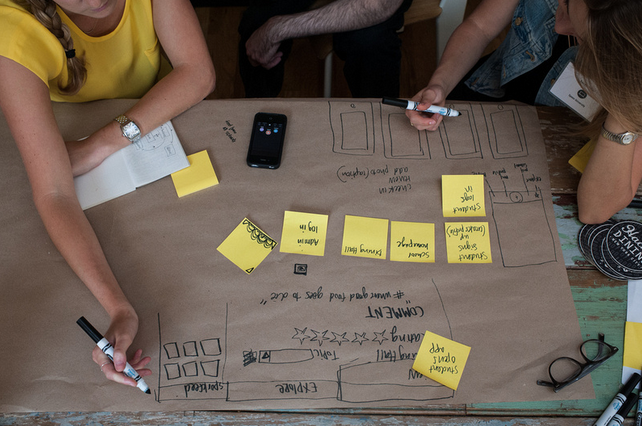 Do you think your online courses intersect with notions of food justice?
Do you think your online courses intersect with notions of food justice?
Yes, definitely. We can empower people to get the skills they need lowering the barriers to acquiring them. If you want to open a food truck, a restaurant or any small food business, but you don't have money or time to go to a formal institution, we want to make it easier for you to succeed. Right now our courses range from $25 to $75, it's really affordable. And it's all about equality, accessibility and offering tools. I see it as a global platform, focusing on food start-ups, food technology, educating farmers—the possibilities are endless!
What's your relationship with feminism working as a founder and CEO?
It's tough to be taken seriously. I definitely see that I'm treated different from men and expectations are higher for me . . . or that I have to prove a lot more.
Is that a phenomenon of the food industry or the tech industry?
I think that I'm fairly young—not by Silicon Valley years— but I'm frequently the youngest person in the room and I end up traveling with people who are very senior. There is more that is expected of me. I think every entrepreneur goes through times when they lose confidence—they feel insecure about things and I think that as a woman it feels even more daunting. The other thing that is a challenge is thinking about family. I don't want to have a family until I'm really secure with this, and of course there's a pressure trying to straddle the two. I do think I've been lucky though. My mother is a successful entrepreneur. She's in life insurance and estate planning. She was one of the first woman agents at New York Life Insurance and she's been there for over 30 years. She taught me a lot—she was a great model in terms of knowing your business, and how to be a woman in a man's world.
What's next on the horizon?
My fall has been all about getting more classes underway. People are excited to share their knowledge and to learn from one another.
What's the most Interesting thing you've learned recently?
I've been reading this article about the founder of BuzzFeed, Jonah Peretti. I learned that he started off as a tech teacher and had to come up with lessons that were accessible and digestible and that served as a lot of inspiration—BuzzFeed came from that. In order to get people to care about the important things you have to make it digestible.
What's your one piece of advice to another entrepreneur?
Everyone is a shitshow—no one knows what they're doing at one point or another! I recently read Hatching Twitter and it was enlightening and comforting to see how many problems they had. this Twitter biography and there were so many problems. When it's your company you can give yourself permission to not know and mess up.




